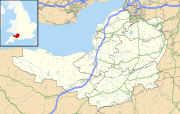Barrow Gurney Nunnery facts for kids
| Monastery information | |
|---|---|
| Order | Benedictine |
| Established | c. 1200 |
| Disestablished | 1536 |
| Site | |
| Location | Barrow Gurney, Somerset, England |
Barrow Gurney Nunnery, also known as Minchin Barrow, was a special kind of religious home for women called a nunnery. It was built around the year 1200 in a village called Barrow Gurney in Somerset, England. This nunnery was a place where Benedictine nuns lived, prayed, and worked together.
Contents
What Was Barrow Gurney Nunnery?
A nunnery is a monastery for women, who are called nuns. The nuns at Barrow Gurney followed the rules of Saint Benedict. This meant they lived a life focused on prayer, study, and work. They often helped people in their local community.
Who Started the Nunnery?
The Barrow Gurney Nunnery was started by a family known as the Fitz-Hardinges. These were important people in England at the time. Early on, the nunnery also received gifts of money. For example, in 1212, a man named Hugh de Wells left 10 marks to the nuns in his will. A mark was a type of money back then.
How Did the Nunnery Get Money?
Over the years, the nunnery received more donations. They got money and land from different people. By 1291, they were also getting a regular payment from the church in Twerton. This payment was recorded in an old survey called the Taxatio.
Later, in 1535, another survey called the Valor Ecclesiasticus checked how much the nunnery was worth. It showed the nunnery had a value of about £29. Even with these donations, the nunnery was often quite poor. By 1398, it had even changed which church area, or diocese, it belonged to, moving to the Diocese of Llandaff.
The End of the Nunnery
The Barrow Gurney Nunnery came to an end in 1536. This was part of a big change in England called the dissolution of the monasteries. During this time, King Henry VIII closed down many monasteries and nunneries across the country.
When Barrow Gurney Nunnery closed, its value was recorded as £31. After it was closed, King Henry VIII gave the land and buildings to a man named John Drew from Bristol. John Drew turned the nunnery buildings into a private home. This new home was given a new name: Barrow Court.
 | Delilah Pierce |
 | Gordon Parks |
 | Augusta Savage |
 | Charles Ethan Porter |


